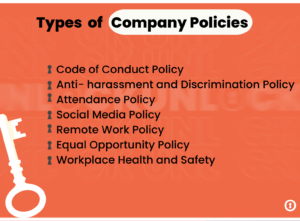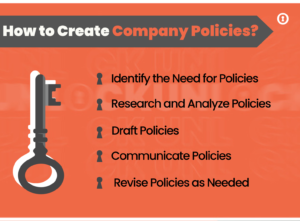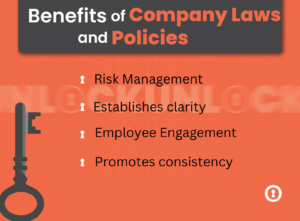Introduction
What are the company’s laws and policies? Are laws and policies applicable to the employees, too? Are you aware of all the policies and laws that are mandatory for all companies?
It is crucial for companies and organizations to comply with laws and policies such as labor laws, environmental regulations, data privacy laws, and anti-discrimination policies. These laws and policies are not only applicable to the company but also to its employees. Company policies and laws also contribute to protecting your business and promoting a safe and enjoyable work environment.
In this blog, we will look at company laws and company policies, as well as the significance of company laws and company policies. You will also find types of company policies and how you can add these policies to your employee handbook. There are various benefits to your company from these policies.
What is a Company Policy?
Company policy is a set of guidelines developed by an organization to monitor the behavior and conduct of its employees. These policies aim to ensure that all employees understand the expectations of the organization and act accordingly. Policies create a framework for consistency in the organization. These policies help to create a professional environment where employees represent the company in a positive light.
Why are Company Policies Important?
Company policy is a crucial aspect of any organization. These policies are important for creating a professional environment that is fair and legally compliant. Company policy is a document in written form that lays out what an organization expects from its employees. These policies are needed for several reasons:
- To provide clear guidance on what is expected of the employees
- Helps in ensuring consistency in which the same rules apply to all employees, regardless of their position, tenure, or personal relationship with management.
- Helps in creating a fair workplace
- It promotes positive company culture by reinforcement of values like respect, honesty, and teamwork.
Types of Company Policies
Code of conduct Policy
A code of conduct is a set of rules and guidelines that define the ethical and professional standards expected from employees. It caters a framework of values and principles that the organization believes in and expects their employees to uphold. It covers areas like conflicts of interest, anti-bribery and corruption, data protection and privacy, workplace harassment and discrimination, and compliance with laws and regulations.
Anti-Harassment and Discrimination Policy
Policy against harassment and discrimination outlines what constitutes harassment or discrimination, provides examples, and details the steps employees should take if they experience or witness such behavior. An anti-harassment and discrimination policy should exist in every organization. It should also state the consequences of violating the policy, disciplinary action, or termination.
Attendance Policy
An attendance policy is a written statement that states the procedures to be followed when dealing with issues like tardiness, no shows, early outs, no-call no-shows, and different types of leave. Furthermore, they also outline progressive disciplinary plans for attendance infractions. For instance, our company expects employees to be on time and regularly. Employees will be given a 10-minute grace period after the start of their shift. Employees who are tardy after that will not be allowed to mark their attendance.
Social Media Policy
Social media policy should outline what employees are allowed to post on social media platforms related to the company. This policy also states guidelines for using social media during work hours.
Remote Work Policy
After the COVID-19 pandemic, remote work has become popular. This shift towards remote work has allowed for greater flexibility and work-life balance for employees, while also reducing overhead costs for companies. Many organizations transitioned to remote work. Remote work policy covers areas such as expectations for working hours, communication, data security, equipment, and technology provided by the organization.
Equal Opportunity Policy
The Equal Opportunity Policy states that discrimination against job applicants or employees if they are members of a protected class (for example, race, gender, age, or religion), is prohibited. This policy is crucial for anti-harassment workplace violence and any non-discrimination policies you may consider developing.
Workplace Health and Safety Policy
It is critical to provide a safe and healthy work environment for your employees. Since violations of health and safety policy in the workplace can cause harm to your employees and damage the reputation of your company, For instance, in your workplace health and safety policy, you can state what an employee should do in case of office emergencies. It can help create a safe working environment and protect workers from hazards.
Also Read: Self Introduction- Useful Advice for Easing the Process
How to Create Company Policies
Designing company policies entails various steps. Following these steps will allow you to create effective policies that promote a safe and productive workplace while also ensuring compliance with legal requirements and industry standards. The step-by-step guide is here:
Identify the Need for Policies
The very first step is to identify the areas where your organization needs policies. These areas can be attendance, leave policies, social media use, a code of conduct, a dress code, performance management, and employee benefits. It’s vital to evaluate your organization’s needs and identify the policies required to ensure compliance with legal requirements and business standards.
Research and Analyze Policies
After identifying the areas where you need policies, the second step is to research and analyze your existing policies. Consult industry associations, review legal requirements and guidelines, and research what other companies in your industry are doing to improve. This can help you design effective policies that are legally compliant and tailored to your organization’s needs.
Draft Policies
Based on your research and analysis, you can draft suitable policies for your organization. Policies should be clear, concise, and easy to understand. The drafting process should involve key stakeholders such as HR managers and legal advisors, to ensure that policies are comprehensive and legally sound.
Communicate Policies
Once your policies have been drafted, the next step is to communicate them with your employees. New policies that are added to the employee handbook must be communicated to the current employees. Have them sign the document mentioning the new policies so that they must follow the rule. During onboarding, discuss these policies with the new employees so they understand what the organization expects from them.
Revise Policies as Needed
Monitor and evaluate policies to ensure that they remain effective and up-to-date. With the growth and evolution of an organization, policies may need to be updated to reflect changes in the business environment, legal requirements, or industry standards. Review your company policies periodically and make revisions as needed.
Benefits of Company Policies
Company policies are the lifeblood of any organization. It helps organizations promote a positive work culture by establishing clear expectations from the employees. This leads to a more successful and sustainable organization. There are numerous advantages to company policies, including:
- Promotes consistency: Company policies and laws establish consistent practices across the organization that ensures that everyone regardless of their position is following the same rules and laws to promote fairness and reduce the risk of discrimination or favoritism.
- Establishes clarity: Laws and policies establish clarity in an organization by providing clear guidance to employees on what is expected of them including their rights and responsibilities. This helps in the prevention of confusion and misunderstandings within an organization.
- Risk management: Organizations can identify and mitigate risks with the help of company policies and laws. Risks related to workplace safety, security, or financial fraud. It protects the organization’s assets and reputation.
- Employee engagement: Company policies help to create a positive workplace culture as it promotes transparency, fairness, and accountability. This helps to improve employee morale and engagement which results in higher productivity and lower turnover.
Also Read: Workplace Ethics | An Ultimate Guide | The Foundation of Success
What are Company Laws?
Company laws are a set of legal regulations that provide a framework for the formation, operation, management, and dissolution of a company or organization. The goal of the company laws is to govern the business environment in which companies operate, to ensure that companies operate transparently, and to protect the interests of stakeholders.
Company Laws that Every Employee Should Know
Minimum Wages Act
The Minimum Wage Act states the minimum wages to be paid to workers in various fields and industries. This act sets a minimum wage that employers must pay to their workers. However, it is applicable to workers in any sector and industry, regardless of whether they are employed in the public or private sector. The main objective of this act is to cater to a decent standard of living for workers and protect them from exploitation by employers who pay them wages below the minimum standard.
Payment of Wages Act 1936
The Payment Wages Act 1936 is an act that regulates the payment of wages to employees in India. This act states that wages must be paid on the 7th of every month. The main objective of this act is to provide workers with their wages in a timely manner and also protect them from arbitrary deductions or delays in payment. In cases of non-payment or underpayment of wages, employees can file a complaint with the appropriate authority under the Act.
Equal Remuneration Act 1976
The Equal Remuneration Act 1976 is enacted by the Indian government to ensure that men and women receive equal pay for equal work and positions. According to this act, the government prohibits discrimination on the basis of gender in matters related to wages and employment opportunities. Violation of this act can result in fines and imprisonment for the employer. This company law promotes gender equality in the workplace to foster a positive work environment for both men and women.
Provident Fund Act 1952
This act was enacted by the Indian government with the aim of providing retirement benefits to workers in the organized sector. A portion of the employee’s salary is deducted and deposited in a provident fund account, and employers are also required to make a contribution to the account. This process accrues interest over time, and the funds accumulated in the account can be withdrawn by the employee at the time of his retirement, or in certain circumstances, such as medical emergencies. It promotes social security and financial stability for workers in the organized sector in India.
Employee State Insurance Act
The Employee State Insurance Act was enacted by the Indian government in 1948. This company law provides medical and financial benefits to workers in the organized sector. Just like the Provident Fund, the Employee State Insurance Act also requires the employee and employer to contribute a certain percentage of salary to the Employee State Insurance (ESI) Fund. Employee’s State Insurance Corporation (ESIC) is an authority that is responsible for the administration of the ESI scheme. This act ensures that workers have access to quality medical care and a safety net in times of financial hardship.
Bonus Act 1965
The Bonus Act regulates the payment of bonuses to employees working in certain establishments. This company law is authorized by the Central Advisory Board, which is responsible for advising the government on promoting the welfare of workers. The Bonus Act establishes that employers are required to pay a minimum bonus of 8.33% of the employee’s salary or wages and a maximum bonus of 20%, subject to certain conditions. Furthermore, it has helped workers receive a share of the profits earned by their employers.
Gratuity Act 1972
The Gratuity Act 1972 states that an employee who has completed 5 years of continuous service with an employer is eligible to receive gratuity at the time of their retirement, resignation, or death. The amount payable is calculated on the basis of the employee’s last drawn salary and the length of service completed by them. Under the Act, the maximum amount of gratuity payable is 20 lakh.
Professional Tax Act
The Professional Tax Act is a tax legislation that imposes a tax on individuals earning a salary or income from their profession. The state government collects this tax, which is calculated on a slab basis; the higher the earnings, the higher the tax rate. Employers deduct this tax from the salaries of their employees and deposit it with the state government.
Shop and Establishment Act
The Shop and Establishment Act enumerates the working and employment conditions of workers employed in shops and establishments, including commercial establishments. This act regulates working hours, wages, break times, overtime, holidays, leave, and termination of service. This act also includes the health and safety of employees, such as cleanliness, lighting, sanitation, and clean drinking water.
Industrial Dispute Act
The Industrial Dispute Act states the resolution of disputes between employers and employees. The aim of this company law is to promote harmony between employers and employees, prevent and settle disputes within the organization, and improve the working conditions of industrial workers. So, next time you have a dispute with your employer or employees, you know what to do.
Maternity Benefit Act
This law was enacted in 1961 to protect the employment rights of women who are going on maternity leave. The Maternity Benefit Act caters to a range of benefits and protections for pregnant women and new mothers. According to this company law, women can have 26 weeks of paid maternity leave which can be taken in one go or in two separate periods.
Also Read: Conflict Resolution- Effective Strategies from Conflicts to Collaboration
Conclusion
In this blog, we have talked about the importance of company laws and company policies. Company policy is a set of guidelines developed by an organization to monitor the behavior and conduct of its employees. Whereas, Company laws are a set of legal regulations that provide a framework for the formation, operation, management, and dissolution of a company or organization. Company policy is a crucial aspect of any organization. These policies are important for creating a professional environment that is fair and legally compliant. There are many types of company laws and policies, and they benefit your organization in many ways. A step-by-step guide is also given in this blog to help you create effective policies for your company.
Learn With DT Evolve
All the first time managers, do you want to upskills yourself for the new position? Are you confused from where you can learn all the skills that you will require to ace your new responsibilities? Taking up a managerial position is not just handling roles and responsibilities or delegating tasks or enhancing performance. Becoming a new manager also involves establishing a strong identity of yourself as a manager. With DT Evolve learn to be an ideal manager and ace every difficulty with ease and powerful efficiency. Here’s the link to the course, First Time Manager Bootcamp.
Frequently Asked Questions (FAQs)
It is important to update company policies as your business is always evolving and growing. Old policies cannot comply with new laws and regulations.
An anti-harassment and discrimination policy is the most important policy for a company.
Examples of company policies are a code of conduct policy, anti-harassment and discrimination policy, attendance policy, social media policy, equal opportunity policy, workplace health and safety, and remote work policy.
The steps to creating company policies are to identify the need for policy, research and analyze policy, draft policy, communicate policy, and revise policies as needed.
It promotes consistency, establishes clarity, improves risk management, and fosters employee engagement.
Company policies and laws are important as they provide clear guidance on what is expected of the employees, help in ensuring consistency, help in creating a fair workplace, and promote a positive company culture.
Company policy is a set of guidelines developed by an organization to monitor the behavior and conduct of its employees. These policies aim to ensure that all employees understand the expectations of the organization and act accordingly.
Company laws are a set of legal regulations that provide a framework for the formation, operation, management, and dissolution of a company or organization.


















